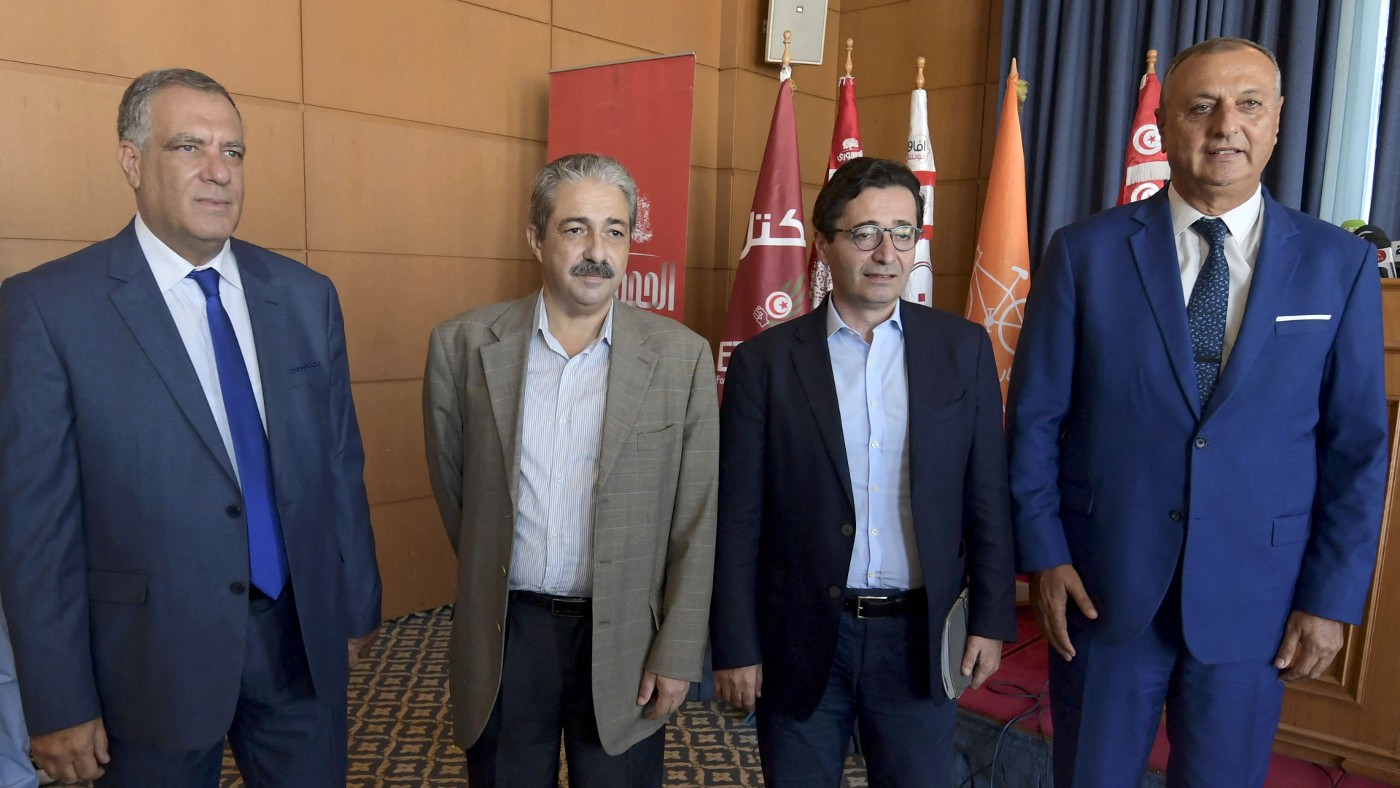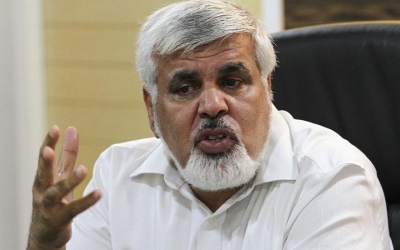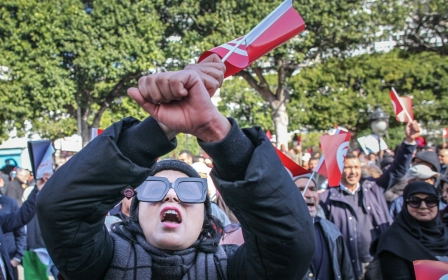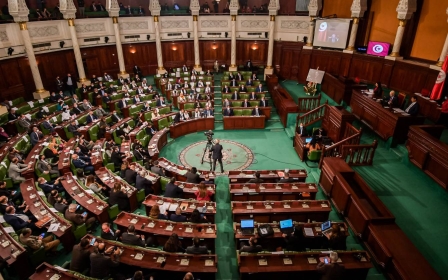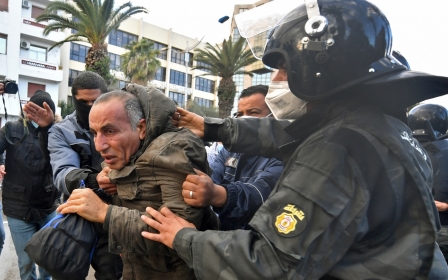Tunisia's political prisoners are being humiliated in filthy bug-infested cells
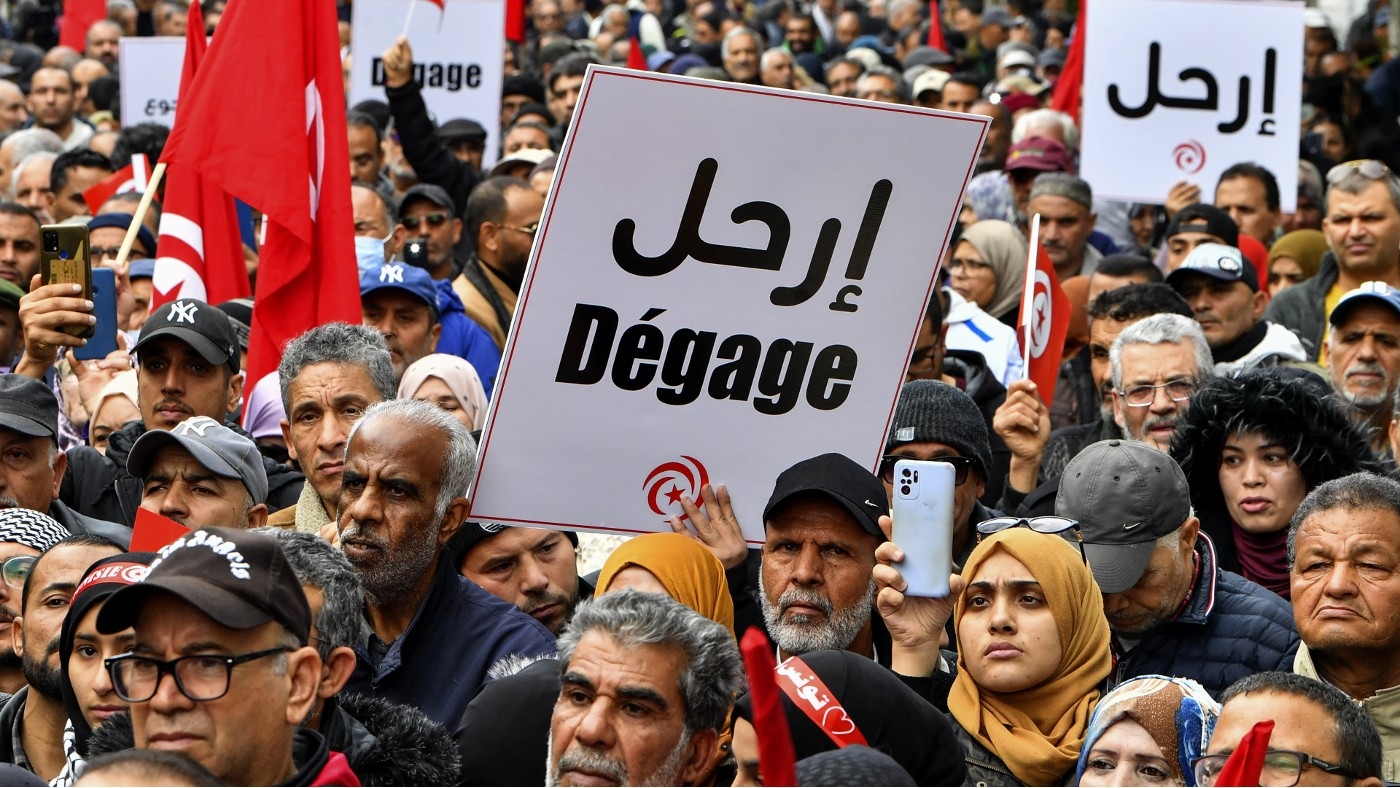
It was Friday 24 March, the second day of Ramadan, and the families of political prisoners had gathered to break their fast in front of El Mornaguia, one of Tunisia's largest penitentiaries.
"Freedom! End the police state! Bring down the coup!" All kinds of chants filled the air, as the sun set on the empty field facing the building and dozens called for the release of all political prisoners, who are now being held in often dangerous and squalid conditions.
In the beginning, things were a little different. "At first, the conditions were normal," Youssef Chaouachi, son of imprisoned lawyer Ghazi Chaouachi, who is a critic of Tunisian President Kais Saied, told Middle East Eye. "My father even got used to his cellmates and to being imprisoned."
But two weeks after Chaouachi's arrest on 25 February, police guards came to force four political prisoners out of their cells to move them to an unknown location.
The prisoners then faced dreadful conditions, with two of them, Issam Chebbi and Khayem Turki, put in cells infested with bugs and insects, and constantly illuminated by five neon light bulbs.
New MEE newsletter: Jerusalem Dispatch
Sign up to get the latest insights and analysis on Israel-Palestine, alongside Turkey Unpacked and other MEE newsletters
"They couldn't sleep, they had no shower, no hot water, no toilet, only a hole in the ground with human faeces all over it," said a family member of Chebbi, who is head of the opposition Republican party.
For almost two weeks, prisoners had to live like this, while their lawyers fought to improve their conditions. "We do not ask for five star hotel conditions. We know the state of prisons in Tunisia. We simply ask for the bare minimum needed for life," said Karim Marzouki, one of the defence lawyers.
"Why this sudden change in cells? This is what led us to believe that these political prisoners are being targeted and that their rights are being violated," Marzouki told Middle East Eye.
In protest at the conditions inside El Mornaguia, several political prisoners have now gone on hunger strike.
'Witch-hunt'
In the past month in Tunisia, about 30 political activists, judges, lawyers and the head of a radio station have been arrested and accused of conspiring against national security, as part of a wide-ranging campaign against the opposition that has been branded a "politically motivated witch-hunt" by Amnesty International.
On 30 March, a Tunisian court refused a request for provisional release by lawyers for eight of the people detained under investigation for alleged conspiracy. The political prisoners are accused of concocting a terrorist plan to overthrow Kais Saied, of conspiring with foreign parties and provoking food shortages, according to lawyers and family members.
"After a lifetime of struggle, they find themselves implicated in a terrorist affair and thrown in cells that do not allow for the most basic human necessities," defence lawyer Abdelaziz Essid said in a statement to local media.
"The case is laughable, it's all just WhatsApp messages," Youssef Chaouachi told MEE. Emna, Issam Chebbi's daughter-in-law, said: "Kais Saied holds all the power. He is responsible, and yet he does not take any responsibility. For each one of his failures, he presents a scapegoat to the people."
A campaign, "We are all conspirators", has been launched to lobby for freedom for all political prisoners in Tunisia.
Targeting opposition
In a Facebook post, the lawyer Ines Harrath said that the government was instructing the prison administration to "humiliate political prisoners and morally destroy them, by denying them the right to wash and ground, and moving them to very dirty rooms, all of them with bugs and insects". She added that prisoners were having to go to the toilet in a "hole in the ground".
Four of the prisoners are being targeted, family members told MEE, as they are Saied's most visible opponents.
They are Chaouachi, who is part of the centre-left Democratic Current party; Chebbi, of the Progressive Democratic party; Turki, who is from the social democratic Ettakatol party; and Jawhar Ben Mbarek, one of the leaders of the left-wing National Salvation Front.
Said Ferjani, another political prisoner, has been jailed in an extremely overcrowded cell with severely mentally ill prisoners. "One of them went to a corner and tried to cut himself. Another has been eating his own skin. Another gouged out the eye of an inmate," said Ferjani's daughter, Kaouther. "A part of us feels like it's intentional to have people like this around my dad," she told MEE.
According to his son, prison guards retaliated against Ghazi Chaouachi for refusing to move from his cell.
"That night, they changed his cellmates and put him in with prisoners charged with theft and murder," Youssef told MEE. "He now fears that his cellmates will be changed every two weeks, every time he gets used to them… They also refused to let him shower that week."
By law, political prisoners and public figures are meant to be kept away from the general population of a prison, for their own protection. The prison administration finally responded to lawyers' demands, when they denounced these conditions in the local press, and prisoners' cells were finally cleaned and equipped with toilets.
But as soon as these changes were made, the prison administration decided to instal cameras in political prisoners' cells, constantly surveilling their every move, allegedly for their own protection.
Round the clock surveillance
"One of the political prisoners told us that he feels like he's an animal in a documentary, being constantly watched and monitored," said lawyer Karim Marzouki.
The prison administration claims that the footage is only watched by a guard before it is destroyed - and that they have received authorisation to instal the cameras from the National Authority for Protection of Personal Data, known as the Instance.
A week later, though, the Instance denied having given this authorisation and urged the prison to take the cameras down, saying in a statement that such surveillance is only legal if prisoners are mentally unwell and pose a threat to themselves.
"Imagine being unjustly thrown in jail and then watched around the clock, even when you change your clothes, go to the bathroom or just speak. Physical torture was outlawed here so they're looking for ways to torture them psychologically," Youssef Chaouchi said.
Political prisoners are still under 24/7 surveillance and despite the illegality of these measures, the prison administration of El Mornaguia has not yet responded to the lawyers' demands.
Families hope for justice in the courts but the children of political prisoners feel resolved to go on.
"My father can be detained for 14 months without trial, but what if after that they send him to prison for 10 or 15 years," Youssef said. "The worst thing is that we don't know how long this can take… After being in prison, my dad has nothing to fear now. He will come back stronger."
"We feel their absence," Emna told MEE. "But all of these attempts are not weakening them. We will not be threatened or silenced."
Kaouther Ferjani echoed both Emna and Youssef. "No matter what happens to me, keep talking, say all of our names - that's what my dad always tells me," she said. "When the rule of law is being thrown out of the window, we can only hope for political change."
This article is available in French on Middle East Eye French edition.
Middle East Eye delivers independent and unrivalled coverage and analysis of the Middle East, North Africa and beyond. To learn more about republishing this content and the associated fees, please fill out this form. More about MEE can be found here.


